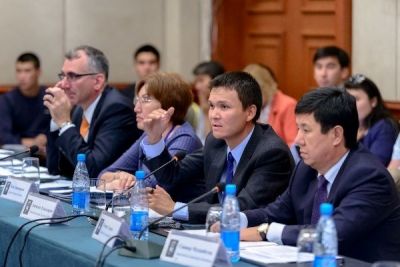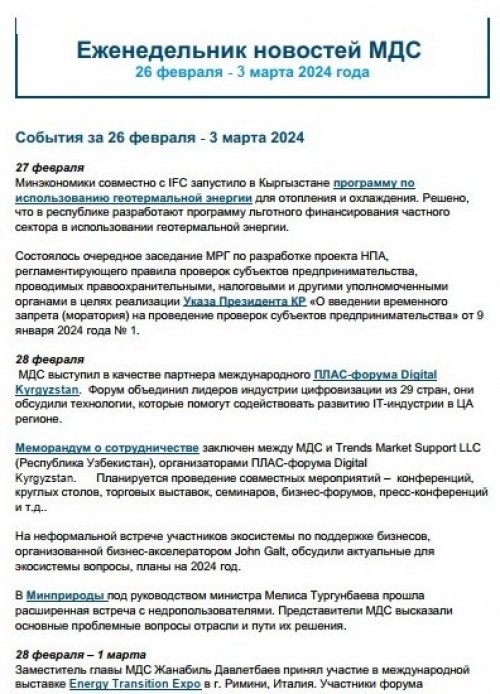News /
IBC news /
IBC presents its vision for economic development of the country

The International Business Council (IBC) held an open meeting to discuss its vision for economic development of Kyrgyzstan. The event held on September 17 was attended by Parliament Members Ulukbek Kochkorov, Rosa Aknazarova, Alla Izmalkova and Mirlan Bakirov, Economy Minister Temir Sariev, representatives of the President’s Office, Government, USAID REFORMA Project, international organizations, business associations, and NGOs.
The participants discussed the conditions (political, economic, legal, and social) that should be created to improve the investment climate in Kyrgyzstan and attract foreign investment in the country. Particular attention was paid to the role of businesses and the local community in the creation of a competitive and predictable tax regime and fighting corruption.
Politics has become the most discussed topic at various meetings in Kyrgyzstan, although it is time to move to other topics, said Parliament Deputy Roza Aknazarova. "We need to talk about innovations that will help develop economy. To move our country forward, we should start talking about science, education, and business development,” said the deputy.
According to Charles Specht, Economic Development Office Director, USAID, the IBC clearly recognizes that the sustainability of economic reforms requires the significant public education for all citizens to understand the policy decisions on economic future. This is particularly critical because Kyrgyzstan is involved in the reforms of democratic governance.
Head of the financial and economic analysis and monitoring department of the Presidential Administration, Nursulu Akhmetova, expressed the hope that the business community’s vision of the country development is based on the National Development Strategy of the Kyrgyz Republic for 2013-2017, and business will propose measures for its sooner implementation. "Your help is important to accelerate the process of reducing state intervention in the business activity,” Akhmetova said.
The country is preparing to join the Customs Union, and intends to continue to participate in the integration process. There are ardent discussions about joining the CU in our society, but we tend to forget the purpose of our economic policy. According to the Development Strategy, it is restructuring of the economy, so we need to rebuild our economy, making it perceptive to new technologies," stressed Akhmetova.
The main problem is the lack of a common vision of economic development in the government between departments and ministries, between different branches of government, and between the public and the authorities, said IBC Executive Director Aktilek Tungatarov. "We need to know where we are going, what our purpose is and what country we would like to have in five or ten years,” said Tungatarov. “Many strategic programs have been developed, but people do not even know about some of them. Many programs duplicate each other. In fact, it turns out that they are not executed,” concluded the IBC Director.
"Due to not solvable disputes between the companies and the state we lose large investors,” said Tungatarov. “Vulnerability of private property, the lack of rules of the game, high bureaucracy, unpredictability of legislation, and the complexity of obtaining permits for foreigners to do business are repulsive factors for not only foreign but also domestic investors. "In Kyrgyzstan, there is an outflow of branded companies and a small influx of Russian and Chinese investment. There is a lot of talk about the lack of political will, problems with the human factor and corruption."
IBC Deputy Executive Director Askar Sydykov presented the IBC vision for the economic development of the country.
In 2009, IBC had already developed such a vision. Now, taking into account the changed economic situation over the past five years, the IBC has developed a new draft concept, which includes eight major areas: good governance, freedom from corruption, fair taxation, quality education, honest courts, law and order, and free elections.
To create an effective management, IBC proposes to reduce duplicative functions of public bodies and to optimize their structure, to introduce e-government, and to harmonize the legislation. Laws and regulations should have clear, unambiguous wording in order to facilitate their performance and ease the administration. As a result, the Government will be able to focus on key public services, reduce regulation that will allow conducting business without undue interference from the state.
The IBC also proposed to accelerate the delivery of public services and interaction with government agencies by electronic means; to create competitive conditions for business; to introduce a system of compulsory harmonization of regulatory legal acts; to provide competitive financing for the regulatory impact analysis (RIA), as well as timely information on the RIA results.
The IBC offered to make the tax regime stable, predictable and understandable that will give businesses the confidence to invest. Tax authorities must serve citizens and companies, and this should be their primary goal, while control is their secondary function.
The Fair Taxation section includes such measures as providing clear incentives to attract investments; tax exemption for agricultural producers; reduction in frequency of reporting of taxes and social contributions for small and medium-sized businesses; and transfer functions for the collection of contributions for state social insurance from the Social Fund to the State Tax Service.
Kyrgyz Concept President Emil Umetaliyev stated a critical opinion on Kyrgyzstan’s entry into the Customs Union. "If the integration brings more favorable and easy conditions for doing business, then there is no objection. But if there are associated limitations, it turns out that teaming up with some partners we are separated from the others. We unite with the three countries, but there are more than 200 countries in the world. Only two percent of the world population lives in the three CU countries. That is, we turn away from 98 percent of the world population, and we believe that we are good in collaboration with two percent. GDP of the three countries is less than five percent of the world GDP," Umetaliyev said.
Economy Minister Sariyev clarified the situation. "Joining the Customs Union does not limit our businesses to export their product. When entering the CU, Kyrgyzstan will not close itself behind an Iron Curtain. There are many integration unions in the world, and they have favorable conditions for their members, but stringent conditions for others, thereby protecting domestic producers. The CU does not govern the export policy but regulates the import duties. Tax policy and other issues are the prerogative of the state," said Sariyev.
Today, the Government's task is to take into account all the risks when entering the CU and minimize them.























